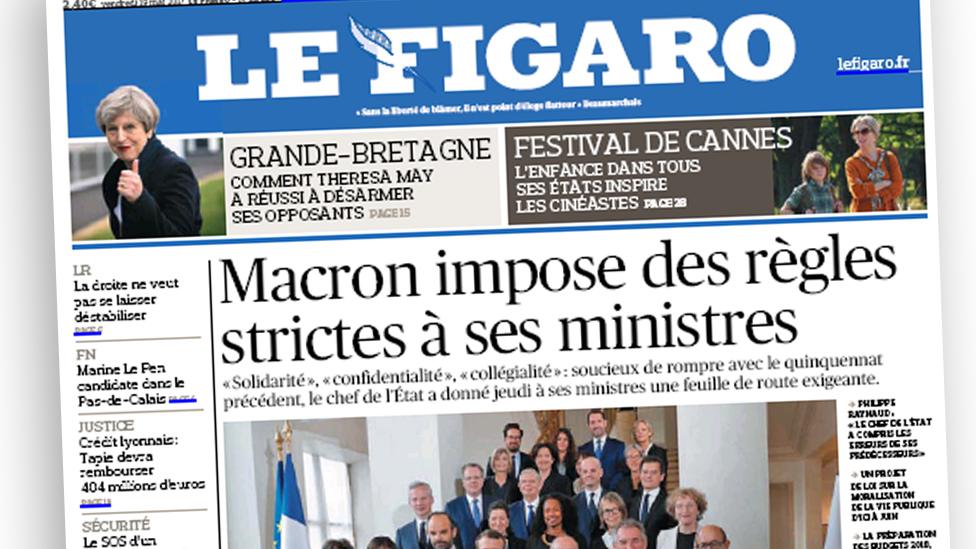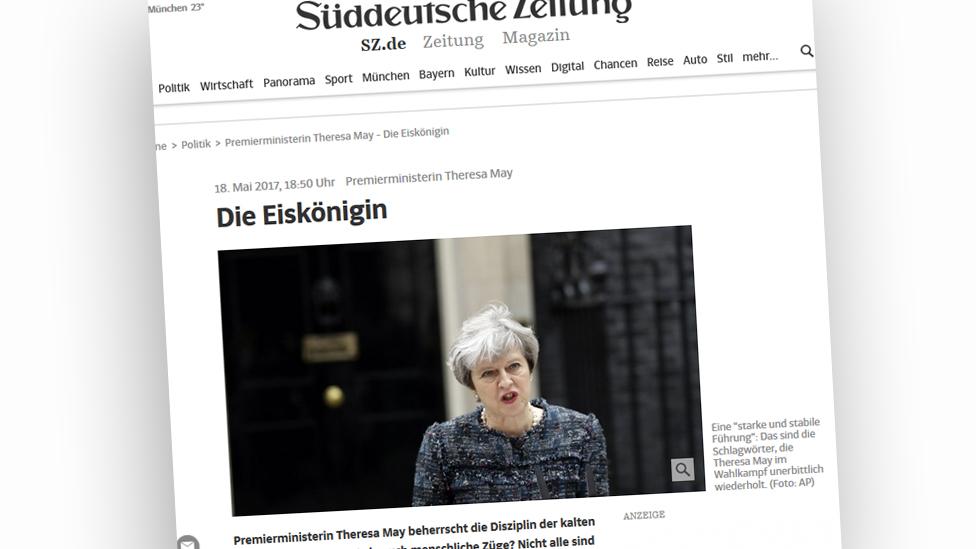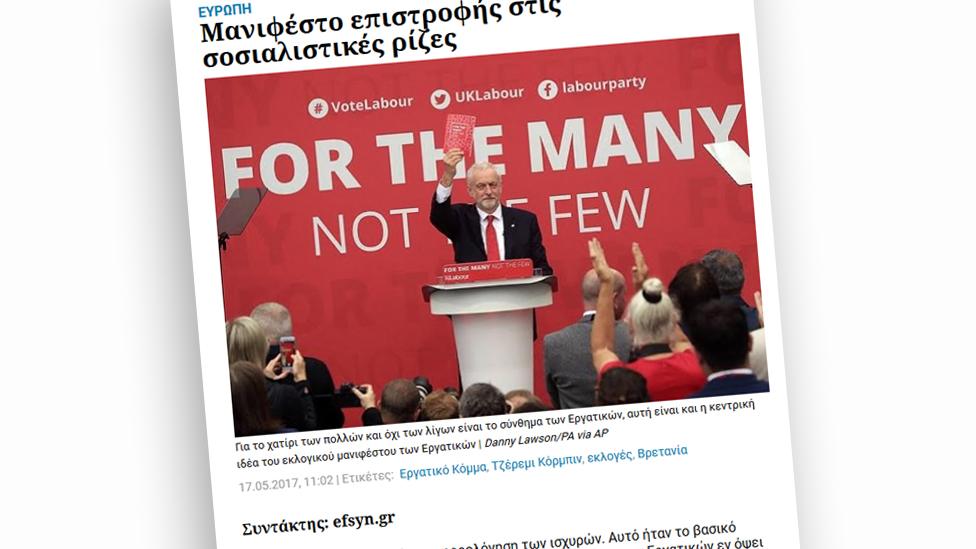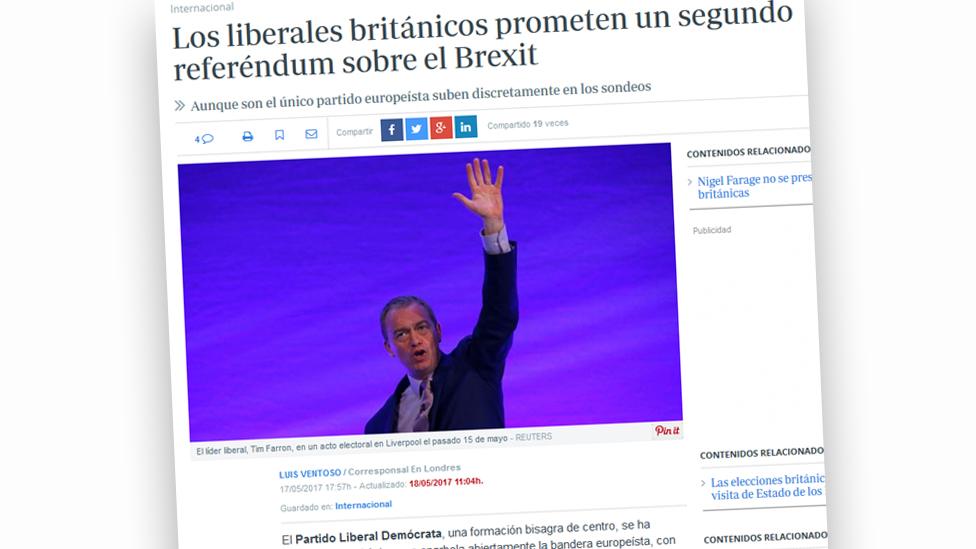General election 2017: Germans call May 'The Ice Queen'
- Published

European commentators see the UK general election as a Conservative power grab - and see little opposition to Prime Minister Theresa May's Brexit agenda.
Most see the Conservative manifesto as a play for Labour's traditional voters, in rejecting Margaret Thatcher's free-market legacy. But there are also warnings against adopting a hard line in the Brexit negotiations.
Labour's manifesto is generally criticised as a throwback to the 1970s. And there is some admiration for the Liberal Democrats' commitment to a second Brexit referendum.
'The Ice Queen'
"Theresa May shakes off Thatcher's legacy", declares Philippe Bernard, London correspondent of France's centre-left Le Monde, external.
He says the prime minister sees the result of the Brexit referendum as a "call to protect voters" from the forces of globalisation, not an invitation for further deregulation. So she has "firmly repositioned the Tories as the party of 'ordinary workers', able to redistribute wealth through the levers of the state".
Mrs May is so confident of victory that she feels able to disregard her traditional Tory constituency in a bid to "smother Labour", he says.
The centre-right French daily Le Figaro, external promotes its article on the Conservative manifesto on its front page, to explain "how Theresa May managed to disarm her opponents".

France's Le Figaro explains "How Theresa May disarmed her opponents"
Its London correspondent Florentin Collomp says, external Mrs May is "treating the election as another Brexit referendum", and deliberately chose to launch the manifesto in "Labour's heartland" constituency of Halifax, which voted heavily to leave the European Union.
He describes her as a "secretive and authoritarian leader… at the peak of her power, who has crushed the opposition to left and right, as well as in her own party".
Christian Zaschke for Munich's centre-left Süddeutsche Zeitung, external also gives an unsympathetic profile of Mrs May as an "Ice Queen… who has mastered the art of cold revenge, and relentlessly repeats her 'strong and stable' message".
Marcus Theurer of the Frankfurter Allgemeine Zeitung, external sees Mrs May campaigning on a "hard Brexit" platform, and notes that she "does not hesitate to stray from the basic Conservative free-market line that has endured for decades".
But he thinks her "no deal is better than a bad deal" line on Brexit "could reduce the scope for compromises in the complicated negotiations with the European Union".

A German daily sees Mrs May as an icy politician
Stefanie Bolzen of the centre-right Die Welt, external says Mrs May is trying to "put foreigners off Britain" by doubling fees to hire foreign staff and increase the costs of accessing healthcare.
She also sees trouble ahead in the Brexit negotiations. "It doesn't matter how big May's majority is, as the 27 EU states have already made their conditions clear", and these include free movement of labour.
Denmark's centre-left Politiken, external is no more optimistic about Mrs May's pledges to balance the budget either. It warns that she will face the "post-election task of keeping track of the British economy, at the same time as having to conduct the complicated Brexit negotiations".
'Robin Hood'
Labour's manifesto is generally seen as the most left-wing in decades, whose appeal is unlikely to extend beyond leader Jeremy Corbyn's base of loyal supporters.
In Le Monde, Aymeric Janier says Labour's "desire to provide protection from cradle to grave" will have some appeal, but is unlikely to galvanise the wider electorate.
Celia Maza, the London correspondent of Spain's right-wing La Razon, external, says the manifesto's soft line on immigration leaves it "far removed both from middle-ground voters and traditional, Eurosceptic Labour supporters".
The Greek centre-left paper I Efimerida ton Syntakton, external is more sympathetic. It says the manifesto "returns Labour to its socialist roots".

Greece's I Efimerida ton Syntakton sees a return to Labour's socialist roots
Enrico Franceschini of Italy's La Repubblica, external dubs Mr Corbyn a "latter-day Robin Hood", but the Labour leader is more frequently compared to another figure - one of his ill-fated predecessors, Michael Foot.
Conxa Rodriguez in Spain's centre-right El Mundo, external alludes to Labour's electoral mauling at the hands of the Conservatives under Mr Foot, saying Jeremy Corbyn's policies "prompted his opponents to recall Gerald Kaufman's indictment of the 1983 manifesto as the 'longest suicide note in history'."
'Flying Europe's flag'
The Liberal Democrats promise to hold a referendum on the UK's final deal with the EU was their most interesting policy for European commentators.
The correspondent of Spain's centre-right ABC, external, Luis Ventoso, says the pledge is delivering only a "slight rise in the poll rating of the only party that openly flies the European flag".
This direct bid for the pro-EU vote is reaping such meagre rewards because "many centre and centre-left voters still don't forgive the Liberal Democrats for joining the 2010-2015 coalition with the Conservatives," he says.

Spain's ABC says the Liberal Democrats "promise a second Brexit referendum"
Mr Ventoso thinks party leader Tim Farron may be "more down-to-earth than his predecessor Nick Clegg", but also comes across as "less intellectually sophisticated", and has had to field "criticism from the left-wing press about his views on abortion and homosexuality".
Eva Ladipo of Die Welt, external expresses admiration for Mr Farron's "extraordinary enthusiasm" for the EU. But she doubts whether this will be enough to take the party into double figures in the election.
BBC Monitoring reports and analyses news from TV, radio, web and print media around the world. You can follow BBC Monitoring on Twitter , externaland Facebook, external.